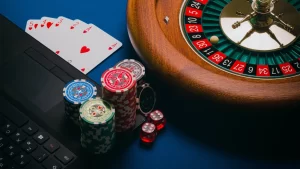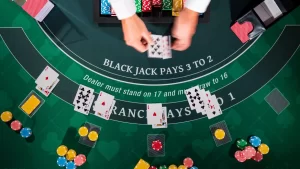
Feng shui in casino design can bring luck and fortune to players, drawing them back for more play. While some may consider this practice superstitious, casinos rely on this concept to keep players coming back again and again.
Feng shui philosophy has found an echo in digital casino interfaces. Studies on color psychology align with Feng Shui principles, stimulating emotions that keep players gambling.
Color psychology
Color psychology ascribes red with passion, excitement and high stakes gambling, making it the go-to color for online casinos to highlight promotions or key elements on their sites – also used to convey urgency or intensity.
Contrastingly, blue is an uplifting color associated with trust and relaxation, often used in casinos to foster an atmosphere of responsible gambling.
Feng shui is an ancient Chinese practice involving the arrangement of objects, buildings and spaces to enhance the flow of energy or qi (pronounced chee). This concept draws heavily from Taoist philosophy as well as concepts like yin and yang.
Many may view feng shui as superstition, but it’s actually an effective and proven way to improve life and wellbeing. Color can have an immense influence on our moods, emotions, and behaviors; therefore it is vital that we understand this aspect when choosing casino colors – from red being thrilling and blue being soothing; knowing how they affect us psychologically will ensure an enjoyable and responsible gambling experience!
Furniture arrangement
Many people believe feng shui can have an influence on their casino gambling success. This ancient Chinese practice involves arranging buildings and objects to foster positive energy flow while taking into account color schemes, furniture placement and lighting to create a harmonious gaming environment.
Common belief holds that the entrance direction to a casino is key to drawing customers in, which explains why many feature a front entrance that complements water flow – like at MGM Grand when Chinese visitors considered its original entry bad luck and therefore required modification.
Red is considered to bring good luck, while gold and green symbolize wealth; therefore casinos tend to use these colors in their interior design. Feng shui also takes into account the layout of casinos, including their symmetry and avoidance of cramped spaces which could reduce player happiness. Lighting plays an integral part in creating a warm, inviting atmosphere – typically soft and diffused for maximum relaxation of gamblers who wish to stay longer in a particular establishment.
Bagua energy map
Feng shui, the ancient Chinese art of creating harmony through space arrangement, has gained more mainstream acceptance over time. One of its primary tools – the Bagua map – often gets less recognition. This diagram divides your home into nine areas (called Guas) which represent different aspects of your life; each Gua can be enhanced further with colors, shapes, or elements such as plants.
Utilizing a bagua map is straightforward and you can apply it to individual rooms in your home or office. Align the bottom edge with the front door of each room, then overlay the map over a floor plan to visualize where each area naturally sits in your space.
Bagua maps can also help you assess your space and address any negative energy in your home, like lackluster wealth areas (northwest). By adding items that strengthen it further.
Feng shui basics
Feng shui is an ancient Chinese art of creating balance and energy flow, its principles being applicable both physically and virtually to casinos and gaming rooms, whether land-based establishments or online casino operations.
Feng shui is often believed to improve gambling luck by encouraging positive energy to circulate throughout a casino, utilizing warm colors and optimal lighting conditions, while discouraging players from counting their bankrolls, which is considered unlucky and can disrupt positive energy flows.
Casino visitors often adhere to superstitious beliefs, believing that practicing feng shui will bring good fortune. Unfortunately, its effectiveness depends on individual beliefs and preferences; some may notice significant effects while others might notice no difference; the key thing is finding what works for you!








